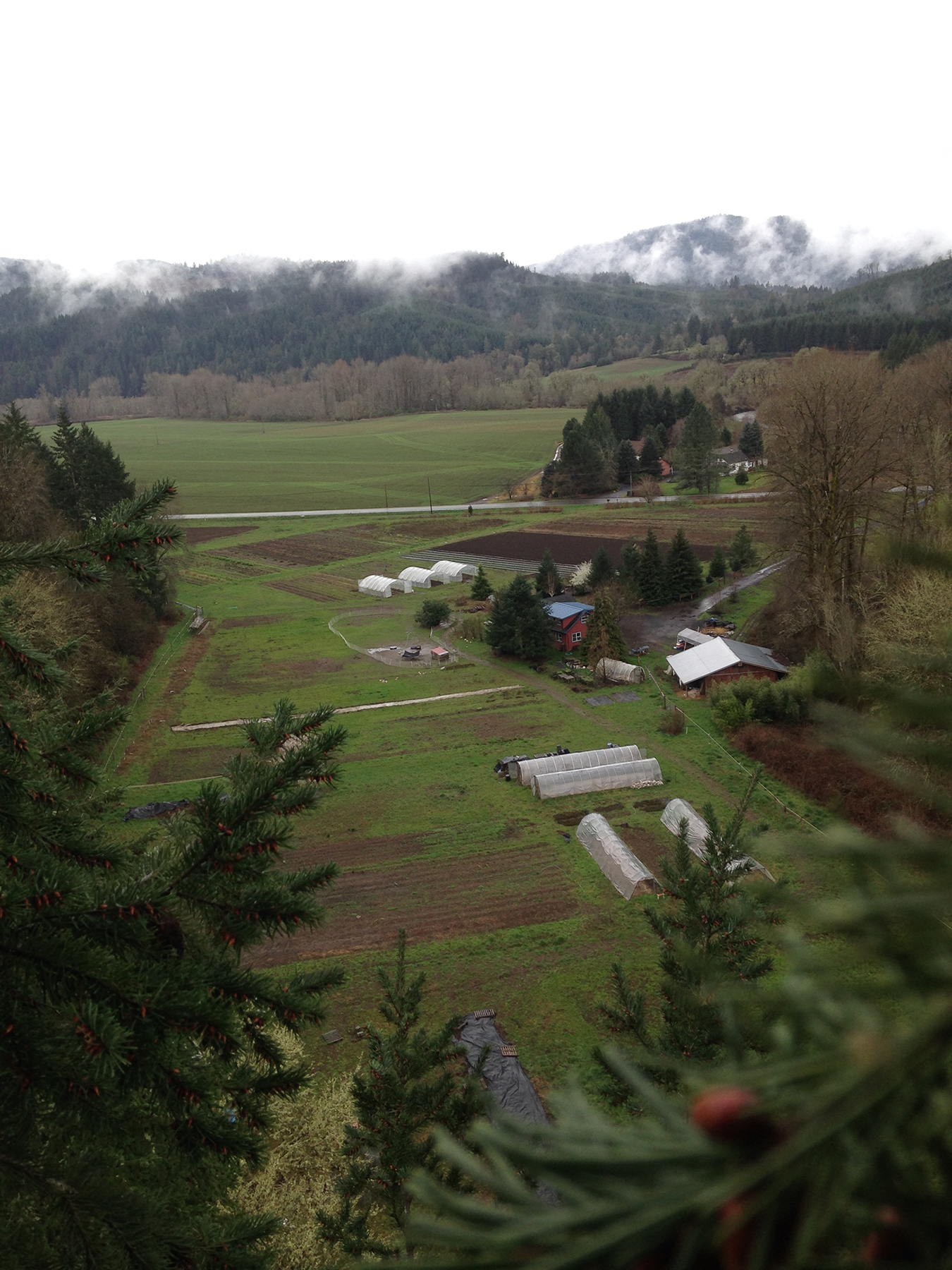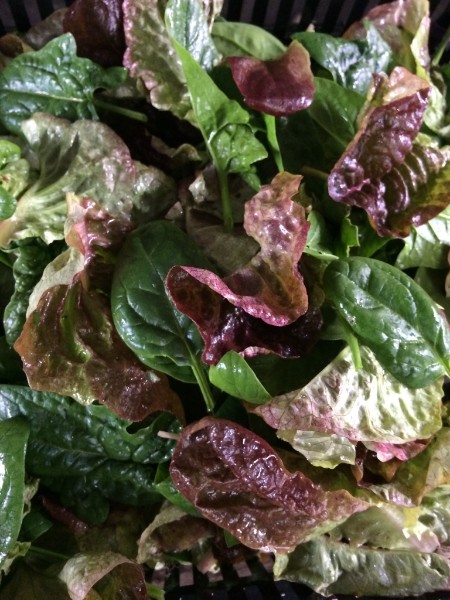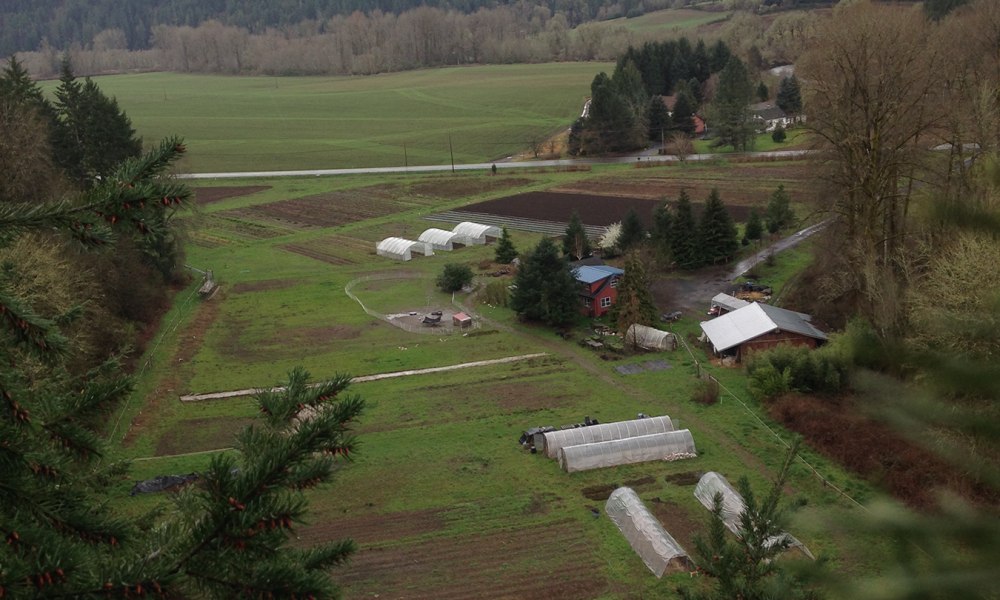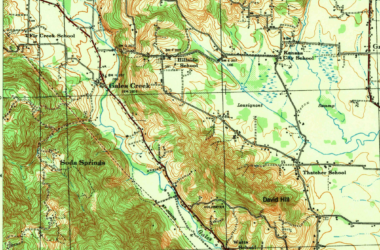 Photo by Max LaMonte. Picture is taken from the tallest tree on our hillside.
Photo by Max LaMonte. Picture is taken from the tallest tree on our hillside.
Garden Starts, aka Baby Plants
Seeds need heat to germinate. Baby plants need less heat to grow, but they do need as much light as possible.
Everything growing so far is hardy, meaning it can stand up to a light or even heavy frost. The first ones planted, in early February, were moved outside 2 weeks ago and are ready to be planted in our fields and in our customers’ garden beds.
 Salad with greens from the high tunnel. Photo by Anna Lund
Salad with greens from the high tunnel. Photo by Anna Lund
We will have a sale of hardy plants for our Gales Creek and Forest Grove neighbors at our farm at 8740 NW Gales Creek on Monday, April 1 from 3:00 pm to 7:00 pm. We will have another sale of tomato plants (60 varieties this year!) and other summer vegetable plants in May.
Testimony
I was asked to provide testimony as a small farmer to the Joint Ways and Means Committee of the Oregon Legislature. All the speakers at this hearing are allowed two minutes to talk, but can submit written testimony if there is more to say than one can cram into two minutes. Here’s an excerpt (slightly edited) from my written testimony. I am putting it into my column to share with readers the incredible value of Oregon State University Extension and the other public service programs of Oregon Universities:
“I am on a quite a number of advisory committees. It’s a way to share what I have learned from a 36-year career in economic development and almost 20 years of farming. I currently serve on the Board of the Institute of Portland Metropolitan Studies, the Oregon Department of Agriculture’s Specialty Black Grant Advisory Committee, and the Oregon Sea Grant Advisory Council, as well as the advisory committee for the OSU Center for Small Farms and Community Food Systems, and on the Board of the North Willamette Horticulture Society, which is staffed by Extension. I would not dream of spending the time it takes to go to meetings, participate in conference calls, review and comment on proposed research, and read and write countless emails, if I did not find these programs incredibly valuable to our own farm, to the statewide community of small farmers, and to the health and life quality of all Oregonians.
“Before we had even made the decision to commit ourselves to farming, we talked to Brian Tuck, an Extension Agent who was then serving small farms in the Portland metro area. He was so encouraging that the next thing we knew, we had gone into debt to buy a tractor. There was no turning back.
“We got so much help from OSU Extension as we started out, and we continue to learn new thing from them all the time. Whether it’s weed control, marketing, environmentally sound pest management, cover crops, or bigger issues with our food system, we can always count on learning something new and helpful their meetings and field days. Extension also offers two programs for beginning farmers: the intensive business planning “Growing Farms” classes, and Small Farms School. I wish we had had these when we were getting started.
“Even better, we have had opportunities to participate in research. Nick Andrews, who developed the Organic Fertilizer Calculator, sat next to me at our farm computer to show me how to use an early version. Years later, he came back to our farm and showed us how to take a sample of cover crop biomass and use his Organic Cover Crop Calculator.
“We have worked closely with Nick over the years and we are thrilled that he is now leading the establishment of Oregon State University’s Organic Extension program. The Organic Extension program has recently undertaken a project to develop Oregon’s winter vegetable industry, funded by the USDA Specialty Crops Black Grant program. Organic Extension is also doing research on cover crop suitability and performance, and staffing the establishment of a Western States Cover Crop Council, in cooperation with USDA Natural Resources Conservation Service.
“We have participated in variety trials for the Northern Organic Vegetable Improvement Coalition and the Culinary Breeding Network. These initiatives are all about growing more delicious vegetables. They could not happen with the enthusiastic participation of OSU Extension.
“The Dry Farming Collaborative, led by Extension Agent Amy Garrett, is helping us conserve water today and prepare for a drying, hotter future. There could not be a better example of grass roots research than the Dry Farming Collaborative.”






